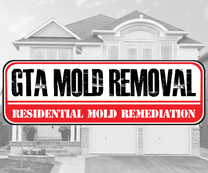GTA Mold Removal specializes in residential mold remediation in Mississauga and surrounding areas. We are licensed, certified, insured, and BBB accredited with an A+ rating.
Utilizing state of the art equipment and protective wear, our Mississauga mold removal crews follow strict remediation and safety guidelines and use non-toxic, environmentally friendly formulas to safely and effectively treat even the most extensive of mold infestations. Our company has invested in the latest mold remediation technology to enhance both accuracy and time efficiency. This allows us to achieve a quicker turnaround for Mississauga homeowners, without compromising safety or work quality. We are fully equipped with the highest grade air HEPA vacuums, industrial sprayers, air scrubbers, commercial dehumidifiers, air movers, and containment barriers.
Mold grows in damp, dimly-lit areas. Indoors, it can often be found in places like attics, basements, crawl spaces, and bathrooms. Mold is also common in other areas if there is a leak in the roof, leaky windows, leaky pipes, or seasonal flooding. Some molds commonly found indoors include aspergillus, chaetomium, cladosporium, penicillium, and stachybotrys (sometimes referred to as black mold, although many types of mold are black in colour). Mold thrives in areas that are moist and warm. Sometimes the mold growth can begin after an area has been wet, and it never dried completely. For example, if a basement is flooded and the carpet is never pulled up to allow the carpet and the padding to dry completely, then mold may start to grow under the carpet. Common places for mold to grow include the bathroom, basement, or any area that may be exposed to moisture from a leak, such as under the sink, in the attic, or under a waterbed.
Mold remediation is the process of removing mold and repairing mold-related damage in the home. It’s a complicated process and must be done carefully in order to prevent further exposure to potentially harmful mold spores. Mold can be cleaned from some materials, like bathtubs and tile, and the surfaces disinfected. Some materials, though, like drywall, wood, and carpeting, are impossible to clean thoroughly and instead must be removed and replaced.
Mold remediation is challenging in part because mold can grow in so many out-of-sight places, including inside walls, under carpeting, above ceiling tiles, and inside heating and air conditioning ducts. Mold removal is also challenging because the process disperses many more mold spores into the air, increasing the risk of mold related illness. Due to safety concerns, we recommend hiring a mold remediation professional for the job, though it is possible to tackle the task yourself if you’re only dealing with a small amount of mold (such as a surface area covering no more than ten square feet) and you have no per-existing health issues that would increase the risk for you. If you’re experiencing symptoms of mold related illness, you should not attempt a mold remediation job yourself, because you can end up exposing yourself to more mold, making your symptoms worse.
Health Canada considers indoor mold growth to be a potential health hazard. Scientific evidence links mold and damp conditions in homes to increased risk of respiratory symptoms, including:
- Eye, Nose And Throat Irritation
- Coughing And Phlegm Build-Up
- Wheezing And Shortness Of Breath
- Other Allergic Reactions
Facts about Mississauga:
Mississauga is located west of Toronto in Peel Region, and has a population of 668,549 (2006).
Mississauga was established as a town in 1968 and a city in 1974.
Its land area covers 288.4 square kilometres.
Mississauga is named from the Mississaugas First Nations tribe (originally from the Georgian Bay area).
Mississauga is the 6th largest city in Ontario, and is located on the shores of Lake Ontario.
It is home to Lester B. Pearson international airport, and has the greatest concentration of major highways in the country.


